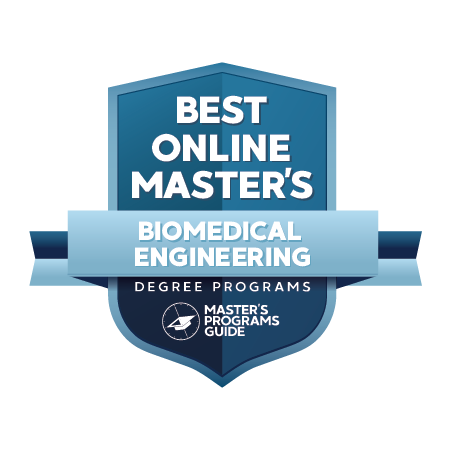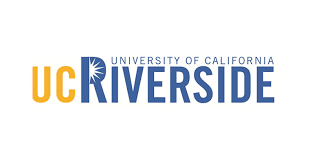Ready to find your ideal master's program?
www.mastersprogramsguide.com is an advertising-supported site. Featured or trusted partner programs and all school search, finder, or match results are for schools that compensate us. This compensation does not influence our school rankings, resource guides, or other editorially-independent information published on this site.
Are you a techie? A math whiz? An inquisitive scientist?
If so, you can learn to lend these skills and interests toward making the world a healthier place. All you need is a degree in biomedical engineering.
Why earn a degree in biomedical engineering?
It’s simple. There are lots of reasons to complete an online biomedical engineering proram.
First, let’s look at what applied biomedical engineering is.
Biomedical engineering is also referred to as bioengineering. It is an emerging and interdisciplinary field. It blends engineering and life sciences.
The study of biomedical engineering examines the intersection between technology and medical science.
Students enrolled in these programs can build scientific, technical, and technological expertise. They lend this to the medical field. You’ll take online courses that prepare you to work in key focus areas. You’ll build practical problem solving skills. These can be used in the biomedical industry or for a successful career just about anywhere else.
Bioengineering grad students build an understanding of biological systems and behaviors. These systems may include:
- cells
- tissues
- organs
- entire organisms
- entire populations
Bioengineering topics in an online master degree may include:
- bioinstrumentation, biomaterials, and biomechanics
- cellular, clinical, genetic, rehabilitation, and tissue engineering
- drug design and delivery and pharmaceuticals
- systems physiology
The bioengineering field also exercises skills in:
- data analysis
- measurement
- simulation
- systems identification
Bioengineering students will learn to apply this understanding. They’ll use their training in the development of cutting-edge devices and technologies. These can support individuals with a variety of health-related challenges.
You will take online courses in applied biomedical engineering. However, you may also take classes in related subjects like:
- human health
- computer science
- mechanical engineering
Your online courses will build upon your undergraduate degree in applied biomedical engineering.
Course delivery is through online or hybrid learning tools and technologies. This allows grad students convenience and flexibility. They can maintain full-time jobs and other personal responsibilities. This is all while earning their master’s degree in biomedical engineering.
Virtual learning may seem to present barriers to hands-on experimentation in bioengineering. The following online programs include case studies and simulations. These bring a laboratory environment to student’s own homes.
Some of the programs listed exist in a blended format. They welcome students to campus for certain classes, laboratories, and/or workshops. These supply hands-on learning and networking opportunities. It also offers online learning.
Biomedical engineers design important technologies and equipment. It is for medical settings, such as devices and software. They may work in industry and hospitals. They might also work in other medical settings, universities, or research institutions.
Biomedical engineers may work in development and manufacturing. This is for medical devices, medical imaging equipment, or pharmaceuticals. They may work as clinical engineers. They can even use biomaterials to develop technologies such as medical implants.
Graduates of the following programs can become innovative engineers and technological pioneers. They blaze the trail to a healthier world.
See Also: 10 Best Master’s in Industrial Engineering
Common Application and Admission Questions for Online Biomedical Engineering Programs
Graduate bioengineering applicants should hold a bachelor’s degree in a related field. This might be:
- biology
- chemistry
- an engineering discipline
- physics
Of course, having completed an online BS biomedical engineering degree doesn’t hurt!
These degrees often need to be from an accredited college or university. This is one that has received a nod from a formal accreditation board. An example is ABET accreditation. An ABET accredited engineering program is valuable.
In most cases, you will complete an online application for biomedical engineering programs.
Applicants must have a cumulative undergraduate grade point average of 3.0 on a 4.0 scale. This can vary depending on the school and their online application requirements. Applicants should have completed satisfactory prerequisite coursework in math and the physical sciences.
The analysis of living systems often needs mathematical and quantitative skills sets. Applicants to a biomedical engineering master’s can expect to need prior coursework. This is in a variety of mathematical areas. These areas may include:
- applied math
- linear algebra
- ordinary differential equations
- calculus-based physics
- engineering economics
- biology
- organic and inorganic chemistry
- human body anatomy and medical physiology
- fluid mechanics
- chemical engineering
- mechanical engineering
- electrical engineering
- neural engineering
- biomechanical engineering
- biological engineering
- computer programming
For a master’s program in biomedical engineering, you will need to submit:
- Graduate Record Exam test scores
- official transcripts with GPA records
- letters of recommendation
- personal statements
- proof of English language proficiency for non-native speakers
Ready to dive in to a rewarding future career in biomedical engineering master’s?
Here are the best biomedical engineering online schools you can find!
See Also: Best Online Masters in Chemical Engineering
What Are the Best Biomedical Engineering Degrees?
We know that you have educational goals that you’re itching to pursue. But you may not know where to start. The editors of Master’s Programs Guide have a unique ranking methodology. It is based on the following three aspects:
40% Potential Salary After Graduation: Average mid-career salary of school alumni
30% Institutional Accreditation: Regional and National Accreditation for the 2019-2020 school year
30% Overall Degree Affordability: Average cost of undergraduate and graduate tuition per school
At Master’s Programs Guide, we strive to do our best to guide you and your family toward a fruitful academic career. The pursuit of knowledge is a noble one. We want to help you reach your goals.
Check out our ranking of the best online master’s programs in biomedical engineering!
10 Best Biomedical Engineering Degree Online Programs
#1. University of Washington
Master of Pharmaceutical Bioengineering
One of the best biomedical engineering masters online is at the University of Washington.
The University of Washington’s Colleges of Engineering and Medicine has a Master of Pharmaceutical Bioengineering.
This is a master’s degree is for working engineers. It’s ideal for scientists, researchers, and other professionals.
You’ll need official GRE scores.
The application checklist also includes:
- unofficial transcripts
- a resume
- a statement of purpose
- two letters of recommendation from professional contacts
The 38-credit curriculum for the biomedical engineering master’s provides advanced education in:
- cellular and molecular biology
- drug design and discovery
- pharmaceutics
- life science and regenerative medicine
- biomedical applications
The core curriculum consists of 16 credits of basic bioscience core courses in:
- molecular and cellular biology
- pathophysiology
- pharmaceutics
- biomedical imaging
- biomedical engineering product development
- biomedical instrumentation
In this program, you’ll develop strong engineering skills. You’ll develop algorithms to solve complex problems in the biomedical world.
Students then choose to follow one of two 10 per credit advanced track options. The drug discovery and design track consists of courses in Drug Discovery and Design. You’ll also take classes inMolecular Targets and Drugs.
The translational pharmaceutics track has courses in Pharmacokinetics and Process Development. Each student will complete six credits of Department of Bioengineering seminars.
The online learning environment includes pre-recorded course sessions.
The biomedical engineering master’s program also includes live virtual discussions. These occur one to two evenings per week. Each student completes a six-credit comprehensive capstone project. This culminates their online education.
The clinical development project for the biomedical engineering master’s is extensive. It outlines the drug development process from start to finish.
UW students often earn their Master of Pharmaceutical Bioengineering in two years part-time.
The biomedical engineering master’s is in an ideal format for international students. It’s great for individuals who travel or move often.
Students can earn a UW professional and continuing education certificate. This is in basic bioscience.
The 16-credit certificate has the same courses as the master’s program core curriculum. Certificate program applications do not need to include Graduate Record Exam scores. They also don’t need letters of recommendation.
Graduates of the program will advance in their current careers. They can also explore job opportunities in new technical careers. They can pursue new biotechnology or pharmaceutical career. Or they can pursue advanced doctoral study in a related field. This online biomedical engineering degree gives students a broad foundation.
#2. University of Illinois at Urbana-Champaign
Master of Engineering in Bioengineering
Another top online masters biomedical engineering degree is at the University of Illinois. These online biomedical engineering degrees are exceptional. They offer the same education you might get on campus. They prepare you for a variety of career paths. You can attend class 100% online.
The University of Illinois at Urbana-Champaign houses an exceptional degree program. It leads to a Master of Engineering in bioengineering.
It is a rigorous, non-thesis degree program. It’s designed for working students. The degree program exists on the university’s campus in the twin cities of Champaign and Urbana, IL. It’s also 100% online.
The 32-credit UI M.Eng. in Bioengineering curriculum is customizable. It offers plenty of distance learning opportunities with:
- design projects
- experience writing code
- elective credits in related fields
There are a wide range of courses related to business and technical skills in bioengineering.
It includes only four key courses.
These courses for the biomedical engineering master’s are:
- Managing Business Operations and Innovation
- Introduction to Financial Decision
- a seminar series
- a team project course
Lecture topics include:
- biomedical imaging
- intellectual property
- life science research
- pharmaceutical discovery
- technology innovation
The three-credit, capstone project focuses on creating solutions for real-world problems. These might focus on fighting disease and ensuring regulatory compliance.
Students may complete a team-based project. They can also complete a self-directed project. This relates to issues in their own workplace.
Some students may complete project presentations and demonstrations. The project work spans across multiple semesters. It’s a good fit for full and part time students in most cases. It provides many opportunities for hands-on learning. You’ll learn how to solve complex problems in applied biomedical engineering.
Students can customize their curriculum through approved graduate technical electives. General bioengineering elective options include:
- biomechanics
- cell and tissue engineering
- computational and systems biology
- imaging and sensing
- therapeutics
- medical device integration (like medical devices for an aging population)
General education courses for this biomedical and mechanical engineering program include:
- Brain, Learning and Memory
- Cancer Nanotechnology
- Human Factors in Health Care Engineering System
Students also have the option to pursue an approved independent study. Don’t wish to take the general bioengineering route? You can choose an alternate core concentration in bioinstrumentation or computational genomics.
The bioinstrumentation concentration for aspiring biomedical engineers covers areas such as:
- biodetection
- medical imaging
- microscopy
It builds students’ skills and gives them hands on experience in:
- product creation and requirements
- FDA approval
- project management
- risk analysis
- software and hardware validation
The concentrated bioinstrumentation curriculum includes courses in biological measurement and seminars in bioinstrumentation. These bring various industry professionals onto campus. They speak about their real-world experiences in the field.
You can pursue a wide variety of research interests. This is all as you complete your course requirements. The program will give you a strong background in a variety of areas. You’ll have the perfect stepping stone to become a biomedical engineer. You can also explore courses from another interdisciplinary field related to this topic.
Bioinstrumentation electives include:
- bioinformatics
- biomedical imaging
- chemical, molecular, and cellular biology
- electromagnetic and acoustic waves
- neuroscience
Bioinstrumentation capstone projects often incorporate elements of:
- competitive analysis
- pilot testing
- product design
- prototyping
The computational genomics concentration explores focus areas such as:
- gene expression
- gene finding
- genome annotation
- network analysis
- phylogenetic reconstruction
- sequence alignment
- physiological knowledge
Computational Genomics students can also expect to learn skills in:
- data management
- operational management
- engineering design
- controlled release of drugs
- how to solve problems in related biomedical sciences
- software tools
The concentrated curriculum for these master’s degrees includes a speaker series. There are courses in:
- Algorithms
- Statistics
- Modeling and High-Throughout Genomics Data Analysis
Computational Genomics elective offerings include:
- Human Genetics
- Math Modeling in Life Sciences
- Plant Genomics
- Population Genetics
This biomedical engineering master’s program welcomes:
- recent engineering graduates
- international students
- early-career engineering professionals
- individuals interested in building careers in medical and health care fields
Tuition bills on a per credit hour basis for both full and part time students in these degree programs. Financial aid is available for the biomedical engineering master’s.
#3. University of Maryland
Master of Engineering in Bioengineering
You’ll find another great biomedical engineering online degree at the University of Maryland.
The A. James Clark School of Engineering has a Master of Engineering in bioengineering. This is within its Fischell Department of Bioengineering. The degree program is through the Office of Advanced Engineering Education.
Students can complete the program online. They can also choose to complete it on the university’s campus in College Park, MD.
Applicants should hold a biomedical engineering bachelor’s degree or a related field:
- biology
- chemistry
- engineering
- physics
- another technical field
This biomedical engineering degree should be from an accredited college or university. They must have graduated with a grade point average of at least 3.0.
Applicants should complete prerequisite coursework in:
- biology
- chemistry
- engineering
- math
- physics
You may have to also take courses outside of applied biomedical engineering. These might be in:
- applied math
- computer programming
- fluid mechanics or biofluidics
- linear algebra
The core curriculum for the biomedical engineering master’s consists of four courses. These include:
- Applied Mathematics in Bioengineering
- Biomedical Device Developments
- Physiology for Bioengineers
- Regulatory Affairs in Medical Product Development
Elective offerings include:
- Additive Manufacturing for Bioengineering Applications
- Application of Biomaterials
- Applications in Biopharmaceutical Engineering
- Applications of Bioinformatics
- Biosensor Techniques, Instrumentation, and Applications
- Genome Editing and Synthetic Biology.
Many students may choose electives from the optional technical elective offerings. These are in the areas of:
- biological science
- math
- professional development
This applied biomedical engineering program is ideal for working biomedical engineers. Technical elective courses include:
- Management of Project Teams
- Project Risk Management
- Sustainability Fundamentals for Project Managers
Students also have the option to complete an independent study. They can also engage in a cooperative learning course. It is called Advanced Experiences in Bioengineering. The degree does not ask candidates to complete a research or thesis component.
UMD students have the option to earn a graduate certificate in engineering. The certificate program consists of four courses for a total of 12 credits. That includes one of the M.Eng. foundational classes. You’ll take three of the program’s elective courses.
#4. Purdue University
Master of Science/Master of Science in Engineering in Biomedical Engineering
Purdue University has a Master of Science or Master of Science in engineering in biomedical engineering. This is through its College of Engineering. This is a top biomedical engineering degree online. It is at the Purdue University West Lafayette campus.
The biomedical engineering program is a concentration. It’s within the university’s interdisciplinary engineering degree.
The online biomedical engineering concentration is for working professionals.
Interdisciplinary engineering applicants must submit:
- official transcripts
- a current resume
- three letters of recommendation
- a 300- to 500-word statement of purpose
You must have completed two calculus courses. You’ll need a course in differential equations or linear algebra.
Admission to the program requires an undergraduate GPA of 3.0 on a 4.0 scale.
Interdisciplinary engineering courses are online. This is in an asynchronous format.
The typical course length is 16 weeks. Summer courses span eight weeks.
Some courses have online group work. There is technical support for all classes in this online biomedical engineering program. Enrolled students will devote nine to 12 hours of study a week for each course. The online program includes proctored exams on set exam days.
Purdue biomedical engineering students may pursue a thesis or non-thesis track. Students can customize their studies. You’ll choose courses that tackle topics in:
- analysis
- biomedical engineering
- life science
- quantitative and analytical processes
- regulatory engineering
Purdue’s interdisciplinary engineering master’s programs have 30 credits of study. This includes 18 credit hours of Purdue engineering courses. The biomedical engineering curriculum includes course offerings such as:
- Biomedical Signal Processing
- Ethical Engineering of Medical Devices
- Regulatory Issues Surrounding Approvals Biomedical Devices
Most students complete the degree program in three years or so. Tuition bills at a per credit rate.
Purdue Online also offers five engineering-related graduate certificate options. Students may pursue a certificate in:
- applied heat transfer
- applied statistics
- digital signal processing
- noise control
- teaching and learning in engineering
Engineering certificates have 10 to 15 credits of study.
U.S. News & World Report ranks Purdue as a top innovative school in the United States. The site also ranks the university among the best engineering schools at the master’s level.
#5. Colorado State University
Master of Engineering in Biomedical Engineering
Another great biomedical engineering online masters is at Colorado State University. It’s in Fort Collins.
Colorado State University Online department of biomedical engineering is outstanding. It offers a superb Master of Engineering with a specialization in biomedical engineering. The program is for working professionals.
You must have prior coursework in:
- calculus
- life science
- ordinary differential equations
- physics
Students at Colorado State University should also have a 3.0 GPA. Required application materials include:
- a resume
- a statement of purpose
- three letters of recommendation from professional sources
The Colorado State University Online biomedical engineering curriculum is extensive.
You’ll learn how the fields of animal and human medicine, engineering, and the sciences come together. You will work with an academic advisor to devise the curriculum that works best for you.
You’ll explore solutions to aid individuals with disabilities, improve health, and fight disease. Biomedical engineering students learn about:
- data analysis
- mechanical design
- biomaterials
Students at Colorado State University also have the option to focus their studies on an area. These include biomechanics, materials, or tissue.
The online biomedical engineering program consists of 30 semester credits of study. This includes:
- 12 foundation credits
- eight depth credits
- seven core credits
- three breadth credits
The core biomedical engineering courses at Colorado State University are:
- Bioengineering
- Quantitative Systems Physiology
Foundation courses include:
- Bio-Inspired Surfaces
- Cell/Tissue Engineering
- Material Issues in Mechanical Design
Depth courses and focus areas include:
- Cardiovascular Biomechanics
- Process Control and Instrumentation
- STEM Communication
Breadth course offerings include:
- Analysis of Time Series
- Nonparametric Methods
- Regression Models and Applications
The online environment includes asynchronous course materials. Students can expect to spend nine to 12 hours per week on each course.
Course responsibilities may include:
- communicating via chat rooms and discussion boards
- reading
- reviewing lecture notes
- studying for exams
- writing papers for biomedical engineering courses
Students will graduate with extensive knowledge in their chosen focus areas. They can conduct biomedical research according to their research interests.
Students build skills applicable to a wide range of fields. These include:
- drug delivery
- mechanical engineering
- military medicine
- nanotechnology
- wound healing
Potential job titles may include:
- biomedical electronics technician
- clinical engineer
- biomedical engineer
- professor
- researcher
U.S. News & World Report counts CSU among the best engineering graduate schools in the nation. The university’s online graduate engineering programs are among the top 50 nationwide. It’s one of the best engineering programs for many reasons. You’ll work with an academic advisor to develop a personalized curriculum. You can also join extracurriculars like a biomedical engineering society. This can expand your professional network and help you land a job in applied biomedical engineering as soon as you graduate.
#6. University of California, Riverside
Online Biomedical Engineering Program
You’ll love the online biomedical engineering degree at the University of California!
Research here has lead to countless breakthroughs in biomedical research. These include:
- discoveries in battery life
- cancer detection
- efficient farming
- happiness analysis
U.S. News & World Report places UCR among the top 50 most innovative schools in the United States.
The university has an innovative Master of Science in engineering. It has a specialization in bioengineering and is online.
The biomedical degree is part of the school’s Bioengineering Interdepartmental Graduate Program. The biomedical research program is 100% online. There are no in-person residency requirements. Students can maintain full-time jobs if they choose to.
The online master’s degree program in bioengineering also offers students flexible admissions. There is a choice between three start dates.
All applicants should have a bachelor’s degree in biological science. Relevant professional experience as a biomedical engineer can substitute.
You should have a strong academic background in math and the physical sciences.
This includes:
- two years of math
- one year each of inorganic chemistry, organic chemistry, and physics
- one course each in biochemistry and molecular biology
All applicants must have completed prerequisite coursework in:
- biochemistry and biology
- chemistry
- engineering
- math
- physics
The interdisciplinary bioengineering curriculum requires 36 quarter credits of study.
The applied biomedical engineering focus explores biological science and engineering. It places a particular emphasis on quantitative research.
It provides an advanced exploration of areas including:
- biological and physiological systems engineering
- cellular and molecular engineering
- computational and experimental biology
- genetics
- the global impact of engineering
The curriculum includes:
- 16 quarter credits of core engineering coursework
- 16 quarter credits in the bioengineering specialization
- four one-credit capstone courses spread throughout the program
The core curriculum prepares students for entry into the biomedical industry. This master’s degree consists of four courses:
- Engineering in the Global Environment
- Introduction to Systems Engineering
- Principles of Engineering Management
- Technology Innovation and Strategy for Engineers
The bioengineering master’s degree specialization also consists of four online courses:
- Biotransport Phenomena
- Cellular and Molecular Engineering
- Engineering Analysis of Physiological Systems
- Integration of Computational and Experimental Biology
Each student also participates in a bioengineering project design course. This includes a written report and literature review. It’s based on research interests in the biomedical industry.
Earn a master’s degree in engineering in bioengineering at an accelerated rate here. This is in as few as 13 months! You can take three to four academic quarters of full-time study instead. The typical timeframe is two years. You can even take four years for the online master if you choose.
This master’s degree has built-in training in technical and management skills. The program is ideal for individuals seeking leadership roles in various biotechnology fields. Riverside MS in bioengineering candidates can pursue a doctoral degree at the same time as the master’s degree.
#7. Columbia University
Master of Science in Biomedical Engineering
The online masters degree in biomedical engineering at Columbia University is one of the best.
Columbia’s Master of Science in biomedical engineering is outstanding. You can earn an Ivy League bioengineering education.
The customizable graduate degree program is delivered online. This is through the university’s Department of Biomedical Engineering. This master’s degree is in the Fu Foundation School of Engineering and Applied Science.
Applicants must have a strong undergraduate record. You should have an undergraduate grade point average of 3.0 on a 4.0 scale.
Required application materials include:
- academic transcripts
- Graduate Record Exam scores
- a personal and professional statement
- a professional resume
- three letters of recommendation
Admissions is on a rolling basis. Apply at least four to six weeks before enrollment at Columbia University.
Course requirements explore:
- applied engineering
- basic engineering
- the biological and physical sciences
It pays particular attention to the areas of:
- biomechanics
- cell and tissue engineering
- medical device development
There is one required course in Computational Modeling of Physiological Systems: Cellular/Molecular. Each student can customize their curriculum. They can choose their own biomedical sciences courses. This is to suit their interests and goals. You’ll work with your academic advisor to create your ideal applied biomedical engineering degree.
Each student in this online biomedical engineering degree chooses three courses from options. These options in applied biomedical engineering include:
- Computational Neuroscience: Circuits in the Brain
- Physiological Control Systems
- Solid Biomechanics
- Sound and Hearing
Students choose one math course in an area such as:
- biophysical modeling
- nonlinear dynamical systems
- partial differential equations
Each student must also choose two biomedical engineering electives. Elective offerings include:
- Artificial Organs
- Cardiac Mechanics
- Tissue Engineering
- Ultrasound in Diagnostic Imaging
Students choose four elective courses from any area within the Engineering School.
The bioengineering online degree has 30 credits of graduate study. This is with an academic average of 2.5 GPA.
Students with an MS in biomedical engineering will complete biomaterials work in:
- improving health and outcomes with medical implant technology
- clinical engineering roles in the healthcare industry
- medical imaging technology development for the human body
- new product development of medical devices for an aging population
All use engineering and technology to improve and sustain human life.
#8. University of Southern California
Master of Science in Biomedical Engineering
The University of Southern California Viterbi School of Engineering is an accredited institution. It’s among the top 10 best graduate engineering schools in the nation.
This applied biomedical engineering program is through the Viterbi School’s Master of Science in biomedical engineering program.
Biomedical engineering applicants must hold a bachelor’s degree from an accredited institution.
Applicants to this interdisciplinary field of study must submit:
- official transcripts
- satisfactory Graduate Record Exam scores
- a resume a personal statement
- three letters of recommendation
These online biomedical engineering programs are a unique blended learning model.
Aspiring biomedical engineers have the option to visit the university’s campus in Los Angeles, CA. This can help them gain hands on experience. You’ll use the skill sets they’ve gained so far in their online program.
The online program in biomedical engineering is for professional engineers.
The interdisciplinary MS in biomedical engineering degree program combines engineering science and physiology. The degree requires 28 units of graduate study. This includes 15 core units and 13 elective units.
Required courses include:
- Physiological Control Systems
- Signal and Systems Analysis
- advanced courses in biomedical systems and the nervous system
- a seminar in bioengineering
Biomedical engineering students may take a thesis- or coursework-based path. Students must earn a cumulative GPA of 3.0 to graduate.
The MS in biomedical engineering program also offers an option to specialize. This is in medical imaging and imaging informatics.
The specialized curriculum covers areas including:
- image security
- informatics infrastructure
- medical simulation
- radiotherapy information systems
The specialized program prepares graduates for careers in:
- imaging
- image processing
- medical imaging informatics
The bioengineering department has a Master of Science in medical device & diagnostic engineering program.
The university’s Department of Biomedical Engineering has wide-ranging research in bioengineering. It houses labs in areas including:
- biomedical microsystems
- computational systems biology
- living systems engineering
The USC MS in biomedical engineering program takes 18 months to two years of full-time study. Part-time students may earn their degree in two and a half to three and a half years. Graduates of the program can pursue careers in medical technology. They can pursue biomedical engineer work. They can also pursue graduate studies in a similar realm.
#9. Harvard University
Master of Liberal Arts, Bioengineering and Nanotechnology
One of the best biochemical engineering schools is at Harvard University. This school has roots that trace back to the 1600s. Harvard University is one of the most prestigious universities in the world.
It is the oldest institution of higher learning in the United States. Yet Harvard keeps up with the times. It offers virtual delivery and degrees in emerging technological fields. Old meets new with the university’s online programs. These include the Extension School’s Master of Liberal Arts in bioengineering and nanotechnology.
Applicants to the online biomedical engineering program must also have a strong undergraduate academic background. This should be in cellular, molecular, and organismal biology.
You won’t have to submit an official application for the biomedical engineering degree. Instead, prospective students start the admissions process by registering for two courses.
Students learn about nanotechnology and work with emerging nanoscale applications.
The program explores the use of nanomaterial for drug delivery. It also looks at the use of emerging biomedical technologies for cellular analysis.
Coursework incorporates data analysis and experimental case studies in bioengineering.
The program curriculum consists of 12 set courses that add up to 48 credits of study. It includes:
- two life science courses
- five engineering science courses
- a course in Ethics and Trends in Biotechnology
The majority of the program is delivered online.
Students must attend two courses on the university’s campus in Cambridge, MA. Students can meet the on-campus requirements in two ways. They can take 15-week on-campus courses in the fall or spring semester. Or they can take three- or seven-week on-campus courses during the summer. Most students will take two to four years to complete their degree programs.
Online course offerings include:
- Engineering of Nanostructures for Targeted Drug Delivery
- Immunology, Stem Cell and Regenerative Biology
- Tissue Engineering for Clinical Applications
It also includes:
- a proseminar
- a thesis proposal tutorial
- a two-part master’s thesis
#10. Johns Hopkins University
Master of Science in Applied Biomedical Engineering
The online bioengineering masters at Johns Hopkins University is one of the best in the world.
Johns Hopkins University is famous for its expertise and innovation in biomedical research and medical care.
Johns Hopkins University offers a Master of Science in applied biomedical engineering. This is through its Whiting School of Engineering. The degree program is for working biomedical engineers and practicing scientists. Students may follow a 100% online pathway. Or they can choose a hybrid pathway. This blends online delivery with classes on the university’s campus in Baltimore, MD. There are also lab opportunities at the Johns Hopkins University Hospital.
Applicants must meet the general JHU admission requirements. These requirements include:
- an undergraduate degree from an accredited institution
- a 3.0 GPA
- submission of all college transcripts
You’ll need some work experience as a biomedical engineer. You’ll gain significant hands on experience and physiological knowledge. If your background is not in biomedical sciences, that’s ok.
Prerequisite classes include:
- calculus-based physics
- chemistry
- molecular biology
- ordinary differential equations
The curriculum consists of 10 courses. These address crucial issues in biology and medicine. It includes five core courses, one focus area course, and four electives.
The core curriculum includes:
- two courses in Physiology for Applied Biomedical Engineering
- a course in either:
- Mathematical Methods for Applied Biomedical Engineering
- Mathematical Methods for Engineers
Each student must also complete a hybrid course in applied biomedical engineering. This is Biomedical Engineering Practice and Innovation. It involves online components. There are two intensive weekends of clinical, design, and lab work on the university’s campus.
Students can choose their four electives from options such as:
- Build-a-Genome
- Human-Robotics Interaction
- Microfabrication Laboratory
- Theoretical Neuroscience
The MS in Applied Biomedical Engineering program emphasizes real-world education. It builds a strong knowledge of:
- medical physiology
- life sciences
- emerging biomedical engineering research
The curriculum explores topics such as electric circuit theory and homeostasis. Students can also expect to build skills in:
- analysis
- clinical communication
- computer simulation
- mathematical modeling
Students can choose to focus their studies by following a track in:
- imaging
- biomedical instrumentation
- translational tissue engineering
The imaging track prepares graduates to analyze data from imaging techniques. These include:
- MRI scans
- ultrasounds
- x-rays
This develops multi-dimensional images. It requires a course in Principles of Medical Imaging. It also offers course options including Biochemical Sensors and MR Imaging in Medicine.
The biomedical instrumentation track prepares students to convert biological signals into electrical signals. Students on the biomedical instrumentation track must complete courses in:
- Medical Sensors and Devices
- Principles of Medical Instrumentation and Devices
- Biophotonics
- Rehabilitation Engineering
The translational tissue engineering track prepares students in many ways. They learn to identify and understand various challenges. For example, repairing and replacing human cells with living cells and tissue. The translational tissue engineering course is Cell and Tissue Engineering.
TTE students can choose from courses such as:
- Biomaterials
- Immunoengineering
- Orthopedic Biomechanics
Applied biomedical engineering grad students must finish within five years. JHU also offers a post-master’s certificate in Applied Biomedical Engineering.
OTHER NOTABLE PROGRAMS
#11. Stevens Institute of Technology
Location: Hoboken, NJ
Degree: Master of Engineering in Biomedical Engineering
Net Price: $40,940
#12. Worcester Polytechnic Institute
Location: Worcester, MA
Degree: Master of Science in Biomedical Engineering
Net Price: $29,040
#13. Villanova University
Location: Villanova, PA
Degree: Master of Science in Biochemical Engineering
Net Price: $56,747
#14. University of South Dakota
Location: Vermillion, SD
Degree: Master of Science in Biomedical Engineering
Net Price: $12,768
#15. University of Missouri
Location: Columbia, MO
Degree: Master of Science in Biological Engineering
Net Price: $30,191










